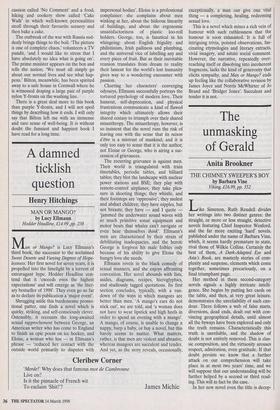A damned ticklish question
Henry Hitchings
MAN OR MANGO? , by Lucy Ellmann Hodder Headline, i14.99 ,pp. 238 Man or Mango? is Lucy Ellmann's third book, the successor to the acclaimed Sweet Deserts and Varying Degrees of Hope- lessness. Her first novel for seven years, it is propelled into the limelight by a torrent of extravagant hype. Hodder Headline con- tend that it 'exceeds even the highest expectations' and will emerge as `the liter- ary bestseller of 1998'. They even go so far as to declare its publication a 'major event', Shrugging aside this burdensome promo- tional patter, one finds a novel which is quirky, striking, and self-consciously clever. Ostensibly, it recounts the long-awaited sexual rapprochement between George, an American writer who has come to England to finish an epic poem on ice hockey, and Eloise, a woman who has — in Ellmann's phrase — 'reduced her contact with the outside world primarily to disputes with impersonal bodies'. Eloise is a professional complainer: she complains about men winking at her, about the hideous linearity of buildings, and about the ergonomic unsatisfactoriness of plastic loo-roll holders. George, too, is fanatical in his whingeing: about English frigidity and philistinism, Irish palliness and plumbing, and the universal vice of labelling any and every piece of fruit. But as their inevitable reunion translates from dream to reality their lament for the world's lost humanity gives way to a wondering encounter with passion.
Charting her characters' converging odysseys, Ellmann successfully portrays the tortured psychology of modern love. Their humour, self-deprecation, and physical frustrations communicate a kind of flawed integrity which ultimately allows their shared ecstasy to triumph over their shared misanthropy. The misanthropy, however, is so insistent that the novel runs the risk of leaving one with the sense that its raison d'être is a mistrust of mankind; and it is only too easy to sense that it is the author, not Eloise or George, who is airing a suc- cession of grievances.
The recurring grievance is against men. Their world is triangulated with train timetables, periodic tables, and billiard tables; they blot the landscape with nuclear power stations and BSE; they play with remote-control airplanes; they take plea- sure in shooting things; they whistle, and their footsteps are 'oppressive'; they molest and abduct children; they have nipples, but not breasts; they have — and I quote 'jammed the underwater sound waves with so much primitive sonar equipment and motor boats that whales can't navigate or even hear themselves think'. Ellmann's men are characterised by their strain of debilitating inadequacies, and the heroic George is forgiven his male foibles only because of his ability to give Eloise the hungry love she needs.
Ellmann revels in the black comedy of sexual manners, and she enjoys affronting convention. Her novel abounds with lists, asides, diagrams, recipes, hieroglyphics, and studiously tagged quotations. Its first section concludes, typically, with a run- down of the ways in which mangoes are better than men. 'A mango's ears do not stick out', we are told, and 'a woman does not have to wear lipstick and high heels in order to spend an evening with a mango'. A mango, of course, is unable to change a nappy, burp a baby, or buy a novel, but this barely seems to matter. What matters, rather, is that men are violent and abrasive, whereas mangoes are succulent and tender. And yet, as the story reveals, occasionally, exceptionally, a man can give one vital thing — a completing, healing, redeeming sexual love.
This is a novel which mines a rich vein of humour with such ruthlessness that the humour is soon exhausted. It is full of intriguing trivia, pointed observations, fas- cinating etymologies and literary extracts, vivid imagery, and astute social comment. However, the narrative, repeatedly over- reaching itself or dissolving into incoherent fragments, lacks the kind of generosity that elicits sympathy, and Man or Mango? ends up feeling like the collaborative revision by James Joyce and Norris McWhirter of Jo Brand and 'Bridget Jones'. Succulent and tender it is not.


































































 Previous page
Previous page